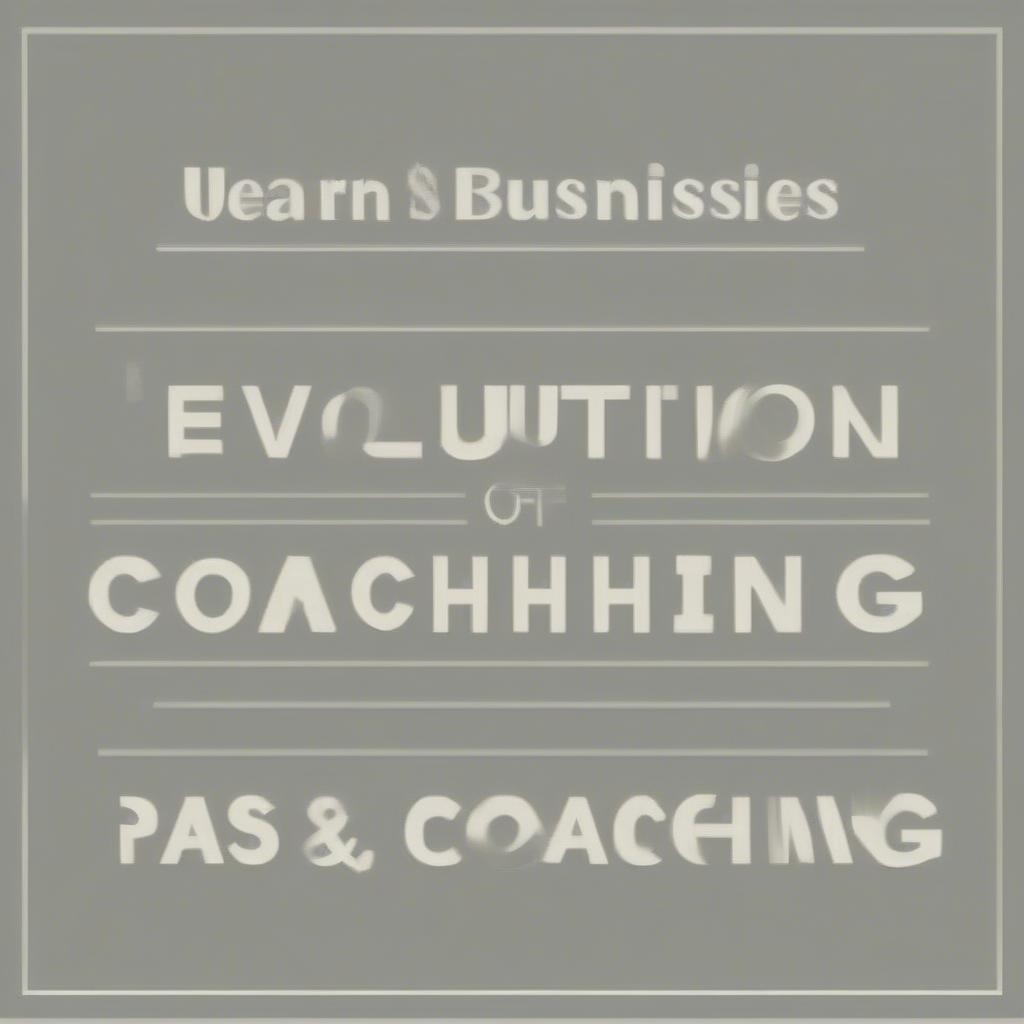
Embarking on a coaching journey without understanding your market is like setting sail without a compass – you might get somewhere, but it’s unlikely to be your intended destination. Effective coaching market research isn’t just a nice-to-have; it’s the cornerstone of a thriving practice. It allows you to pinpoint your ideal clients, understand their needs, and tailor your services to make a real impact. This comprehensive guide will walk you through the essential steps to conduct insightful research, ensuring your coaching business is built on a solid foundation.
Why is Market Research Crucial for Coaches?
Before diving into the "how," let’s explore the "why." Why is coaching market research so vital?
- Pinpointing Your Ideal Client: Market research helps you uncover the specific demographics, pain points, and aspirations of your target audience. Understanding their challenges means you can offer solutions that truly resonate.
- Validating Your Coaching Idea: Before investing time and resources, research can confirm whether there’s a real demand for your unique coaching approach. It prevents you from building a business no one needs.
- Competitive Advantage: By studying your competition, you can identify gaps in the market and differentiate your services, standing out from the crowd. This insight allows you to carve a unique niche for yourself.
- Effective Marketing Strategies: Understanding your market means you can tailor your messaging and marketing efforts to speak directly to your ideal client, increasing your conversion rates.
- Pricing Strategically: Market research provides insights into what your target audience is willing to pay for coaching services, enabling you to price your offerings competitively and profitably.
- Boosting Business Sustainability: Ultimately, effective market research leads to a more sustainable and successful coaching practice by making informed decisions and strategically aligning with the market’s needs.
In short, coaching market research is the bedrock of a thriving practice. It transforms your guesswork into calculated moves, setting you up for long-term success.
Essential Steps in Your Coaching Market Research
Now that we understand the importance of market research let’s dive into the actual process. Here are the fundamental steps to undertake:
1. Defining Your Niche
Before you can research, you need to identify your coaching niche. What specific area are you passionate about and where can you provide the most value? This is not just about what you like to coach on but also about what the market needs. You might love life coaching, but delving deeper, you might find your strength in helping busy professionals achieve work-life balance.
- Reflect on Your Expertise: What are your skills, experience, and education? Where do you naturally excel?
- Identify Your Passion: What topics do you find endlessly fascinating? What gets you excited to learn and share?
- Assess Market Demand: Does your niche have an audience that is actively seeking coaching? Are there enough people who are willing to pay for this kind of help?
-
Consider Profitability: Can you build a sustainable business within this niche? Is it profitable?
Example: Instead of being a general “business coach,” you could narrow it down to a “business coach for e-commerce startups” or “a financial coach for female entrepreneurs.”
2. Understanding the Coaching Industry Landscape
Now, it’s time to zoom out and get a picture of the broader coaching industry insights. This will help you see trends, identify opportunities, and understand the competition.
- Industry Reports and Statistics: Search for reports and statistics about the coaching industry. Look for information on growth, trends, and revenue. There are industry associations that release market analysis and reports.
- Online Forums and Communities: Join relevant online forums and communities where coaches hang out. See what topics they’re discussing, the challenges they face, and what is working for them.
- Competitor Analysis: Identify coaches who are operating within your niche. Who are they? What are their offers? What are their strengths and weaknesses? Use this to see how you can differentiate yourself.
- Social Media: Check social media platforms to understand current trends and conversations within the coaching sector. What are clients engaging with? What topics are trending?
- Podcast and Blogs: Listen to coaching-related podcasts and read relevant blogs. This will give you an idea about what are the popular topics and issues are being discussed.
3. In-Depth Target Audience Analysis
This is where your research gets personal. You need to understand your ideal clients – their needs, desires, and challenges. This is an essential step in target audience analysis.
- Demographics: Age, location, gender, income, education, etc.
- Psychographics: Values, beliefs, interests, lifestyle, attitudes.
- Pain Points: What problems are they facing that coaching can solve?
- Goals and Aspirations: What do they want to achieve? What are their biggest dreams?
- Preferred Communication Channels: Where do they spend their time online? What social media platforms do they use?
- Objections: What prevents them from investing in coaching? What are their biggest doubts?
-
Language and Tone: What kind of language resonates with them? What kind of messaging attracts them?
Methods for Gathering Target Audience Data:
- Surveys: Create online surveys using tools like Google Forms or SurveyMonkey. Ask targeted questions to understand your audience. (See below for examples)
- Interviews: Schedule one-on-one interviews with potential clients. Have real conversations and gain deep insights into their needs.
- Focus Groups: Gather small groups of potential clients for discussions. This allows you to understand a variety of perspectives.
- Social Media Listening: Use social media monitoring tools to track conversations and mentions related to your niche.
- Website Analytics: If you have a website, use analytics tools like Google Analytics to track user behavior.
- Customer Feedback: If you’ve already got clients, listen to their feedback. What do they appreciate? What could be improved?
4. Competitive Analysis
Understanding your competition is not about copying them but identifying opportunities to differentiate yourself. You can find gaps and then use your own strengths to fill the gaps.
- Identify Your Competitors: List the coaches who are working in your niche.
- Analyze Their Offers: What kind of packages, pricing structures, and programs do they offer?
- Study Their Marketing: How do they promote themselves? What kind of messaging do they use?
- Website and Social Media Presence: Examine their websites and social media profiles. What does their online presence look like?
- Unique Selling Proposition (USP): What makes them unique? How can you differentiate yourself from them?
- Client Testimonials: What do their clients say about them? What are the recurring praises and complaints?
5. Validating Your Coaching Offering
Research is also about testing if your idea is actually appealing to your target audience.
- Pilot Programs: Offer a limited, low-cost program to a small group of potential clients. Get their feedback and make adjustments.
- Free Sessions: Offer free discovery or consultation sessions and ask for feedback.
- Feedback and Iteration: Based on the feedback, make changes to your programs, offerings, and messaging.
- A/B testing: Conduct A/B tests on your marketing materials like emails, landing pages to see what works best with the audience.
6. Document and Analyze Your Findings
Market research is not a one-time task. It’s an ongoing process of continuous improvement.
- Organize your data: Keep track of all the information you gather in an organized way. Use spreadsheets, documents, or project management tools.
- Identify Patterns and Trends: Look for patterns and trends in your data. What are the common themes?
- Make Data-Driven Decisions: Use your research to make informed decisions about your offerings, marketing, and business strategy.
- Regularly Review: Review your market research findings regularly and adapt your approach as needed. The coaching industry and the needs of your target market might change, so you need to be flexible and adapt.
Practical Tools and Techniques for Coaches
Now, let’s equip you with some practical tools and techniques to make your research more effective:
Survey Questions Examples
Here are some examples of questions you can ask in your surveys:
- What is your biggest struggle right now related to [your coaching niche]?
- What does success look like for you in [your coaching niche]?
- What do you find most frustrating when trying to achieve [your coaching goal]?
- What have you already tried to solve this problem?
- What is stopping you from reaching your goals in [your coaching niche]?
- What are you looking for in a coach?
- How much are you willing to invest in coaching to achieve [your coaching goal]?
- What kind of content do you like to consume related to [your coaching niche]?
- What are your preferred ways to connect with a coach (e.g., one-on-one, group sessions, online community)?
- On a scale of 1 to 10, how important is it for you to achieve [your coaching goal]?
Interview Questions Examples
Here are some examples of questions you can ask in your interviews:
- Tell me about a time you felt frustrated with [your coaching niche].
- What is the biggest challenge you are currently facing in achieving [your coaching goal]?
- What would achieving [your coaching goal] mean to you personally?
- What do you wish you had more help with when it comes to [your coaching niche]?
- Have you worked with a coach before? If so, what was your experience?
- What is your biggest hesitation about investing in coaching?
- How would you describe the perfect coach for you?
- If you could wave a magic wand and instantly solve one problem related to [your coaching niche], what would it be?
- What kind of support and resources would be most valuable to you?
- How can a coach add the most value to your life and help you achieve [your coaching goal]?
Competitive Analysis Template
Here is a simplified competitive analysis template:
| Competitor | Offers (Packages/Programs) | Pricing | Marketing Strategies | Website & Social Presence | USP | Client Feedback | Strengths | Weaknesses |
|---|---|---|---|---|---|---|---|---|
| Competitor 1 | ||||||||
| Competitor 2 | ||||||||
| Competitor 3 |
Fill out this template with your research findings for each competitor to help you spot opportunities.
Tools and Platforms
- Survey Tools: Google Forms, SurveyMonkey, Typeform
- Social Media Monitoring Tools: Hootsuite, Buffer, Brand24
- Website Analytics: Google Analytics
- CRM: HubSpot, Zoho, Salesforce
- Spreadsheets: Google Sheets, Microsoft Excel
- Project Management: Asana, Trello, Monday.com
- SEO Tools: SEMrush, Ahrefs, Google Keyword Planner
How Learn Business Supports Coaches Through Market Research
At Learn Business, we understand that diving into market research can feel overwhelming. That’s why we’re committed to providing coaches with the resources and guidance they need to succeed. We offer a range of templates, guides, and support services tailored specifically for coaches who want to perform effective market research and build a successful business.
- Market Research Templates: We provide ready-to-use templates for surveys, interviews, and competitive analysis. These templates are designed specifically for coaches and help you get started quickly and easily.
- Niche Discovery Guides: We offer a step-by-step process to help coaches find the niche that resonates with them and the market.
- Target Audience Analysis Resources: We provide guides and resources to help you understand your ideal client deeply and create targeted messaging that resonates.
- Competitive Analysis Frameworks: Our framework help you understand and differentiate from your competitors in the coaching market.
- Business Planning Templates: We offer templates that help you take your research findings and develop a comprehensive business plan.
- SEO and Marketing Guides: We provide guidance on how to implement your research findings in your SEO and marketing strategies.
- Personalized Guidance: In addition to resources, we offer personalized guidance and support from experienced business coaches who can help you navigate the complexities of market research and business building.
By partnering with Learn Business, you can bypass the common pitfalls of starting a coaching practice and gain a head start towards building a thriving business. We help you make informed decisions based on data rather than assumptions.
Conclusion: Mastering Market Research for Coaching Success
Effective market research is not a luxury but a necessity for any coach who wants to build a sustainable, successful practice. By understanding your market, you can tailor your offers to resonate with your ideal clients, differentiate yourself from the competition, and attract the clients who are right for you. The journey might seem daunting but by implementing the step-by-step guide and leveraging the right tools and resources, you can confidently navigate the process and lay a solid foundation for a thriving coaching practice. Remember, coaching market research, target audience analysis and coaching industry insights are ongoing processes that require your continuous attention and adaptation. And always remember, Learn Business is here to support you every step of the way.



Leave a Reply